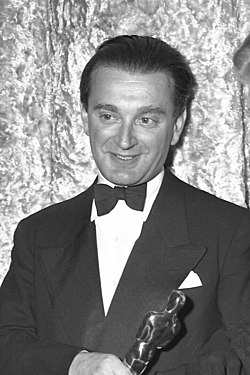| 32nd Academy Awards | |
|---|---|
 Official poster | |
| Date | April 4, 1960 |
| Site | RKO Pantages Theatre, (Hollywood, California) |
| Hosted by | Bob Hope |
| Produced by | Arthur Freed |
| Directed by | Alan Handley |
| Highlights | |
| Best Picture | Ben-Hur |
| Most awards | Ben-Hur (11) |
| Most nominations | Ben-Hur (12) |
| TV in the United States | |
| Network | NBC |
The 32nd Academy Awards ceremony was held on April 4, 1960, at the RKO Pantages Theatre, to honor the films of 1959.
Contents
- Awards
- Honorary Awards
- Jean Hersholt Humanitarian Award
- Presenters and performers
- Presenters
- Performers
- Multiple nominations and awards
- See also
- References
William Wyler's Bible epic Ben-Hur won 11 Oscars, breaking the record of nine set the previous year by Gigi . This total was later tied by Titanic in 1997 and The Lord of the Rings: The Return of the King in 2003. Wyler became the third (and most recent) person to win more than two Best Director awards (following Frank Capra and John Ford), as well as the only person to date to direct three Best Picture winners (following Mrs. Miniver in 1942 and The Best Years of Our Lives in 1946).
Most of the stars were absent as a result of an incident involving Jerry Lewis' staging of the closing number at the previous year's Oscars [1] and of a four-week actors' strike. [1] The studios had their final pullout of support for the Academy during the year, in a sentiment echoed by Paramount Pictures, which remarked, "why should Paramount sponsor a show that sponsors only MGM's Ben-Hur?" [1]
A highlight of the ceremony came during the presentation of the award for Best Story and Screenplay Written Directly for the Screen: absent winner Stanley Shapiro (for Pillow Talk ) had his co-winner, Maurice Richlin, ask presenter Tony Curtis to read his acceptance speech, which read, "I'm trapped downstairs in the gentleman's lounge. It seems I rented a faulty tuxedo. I'd like to thank you upstairs for this great honor." The audience roared in laughter. [2]














